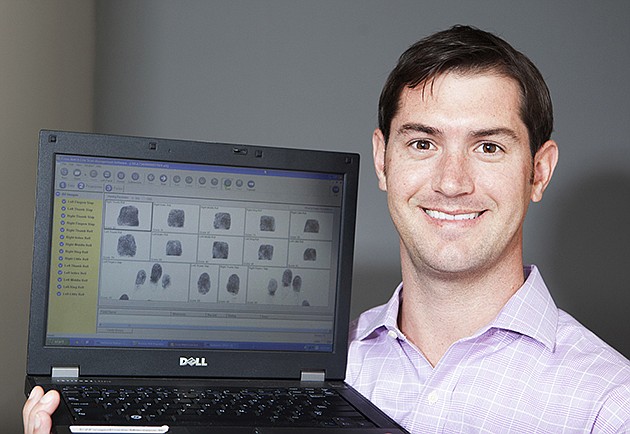- November 24, 2024
-
-
Loading

Loading

When Tampa entrepreneur Alex Chamberlain sought ideas about how to grow his fingerprints and background check business, he went straight to the shirts.
That happened at a lunch meeting with Leeward Bean, a Dunedin businessman who built a national franchise success out of Big Frog Custom T-Shirts. Chamberlain read about Bean in an article, and the lunch meeting sparked ideas on how Chamberlain could grow his business, EZFingerprints.
Largo-based EZFingerprints performs onsite Level 2 FBI background checks and fingerprint services for a host of businesses and organizations, from real estate brokerages to hospitals to massage chains. The model is exceedingly simple: There are walk-in appointments, or EZFingerprints will come to the client. Customers pay in cash, check, credit or invoice. The service is available before and after business hours and even on some holidays.
Chamberlain founded EZFingerprints in 2010, with a loan he used to invest in $30,000 worth of equipment. In July 2013, after he met with Bean, Chamberlain created a membership model for the background check business, which is a play off a franchise. Chamberlain projects around $600,000 in revenues in 2015, up about 20% over 2014.
The membership model, like the business, is simple. For around $21,000, EZFingerprints provides equipment, training, software and a startup guide to operations to get a fingerprints business up and running. EZFingerprints makes its money from the initial support and an ongoing monthly membership program that provides marketing materials and access to additional resources, like cold calling scripts, email newsletters and advice. Unlike a franchise, EZFingerprints does not dictate pricing or how the business runs.
EZFingerprints has four members and looks to grow to 25 in Florida. The growth plans come from humble beginnings. Chamberlain, for one, founded EZFingerprints off a frustration that threatened his previous livelihood.
That happened in June 2010, when he was notified that all 60 employees from his home health care business would need to undergo additional background checks due to changes in Florida laws. By August of that year, all home health care employees statewide needed to pass a Level 2 FBI background check. The new regulations were a response to multiple investigations into companies exploiting the elderly in Florida.
Up until then, Chamberlain's firm, Clearwater-based EasyLiving, had paid $24 per employee for the background checks. With the new legislation, the price jumped to about $65 an employee.
And it wasn't just the per-employee cost that caused Chamberlain, executive director at EasyLiving, agitation. Determining who would be responsible for the cost was another question.
The elder care industry has a high employee turnover rate, of 60% to 70%, mostly due to the unpredictable nature of how long a client will need assistance. Once a client dies, it may be a while before the employee will be assigned a new client, which often results in an employee moving to a competitor for a while. “If EasyLiving paid for this cost, then we could be paying for our competition,” Chamberlain says.
Chamberlain knew this issue would impact a number of businesses. In Pinellas County alone, there are 150 home health care companies, and the background checks expire every year. Chamberlain also hopes to expand EZFingerprints to other states. He's heard a lot of interest from companies in Texas, for example. “The model only works,” says Chamberlain, “if you share the similar passions and frustrations.”